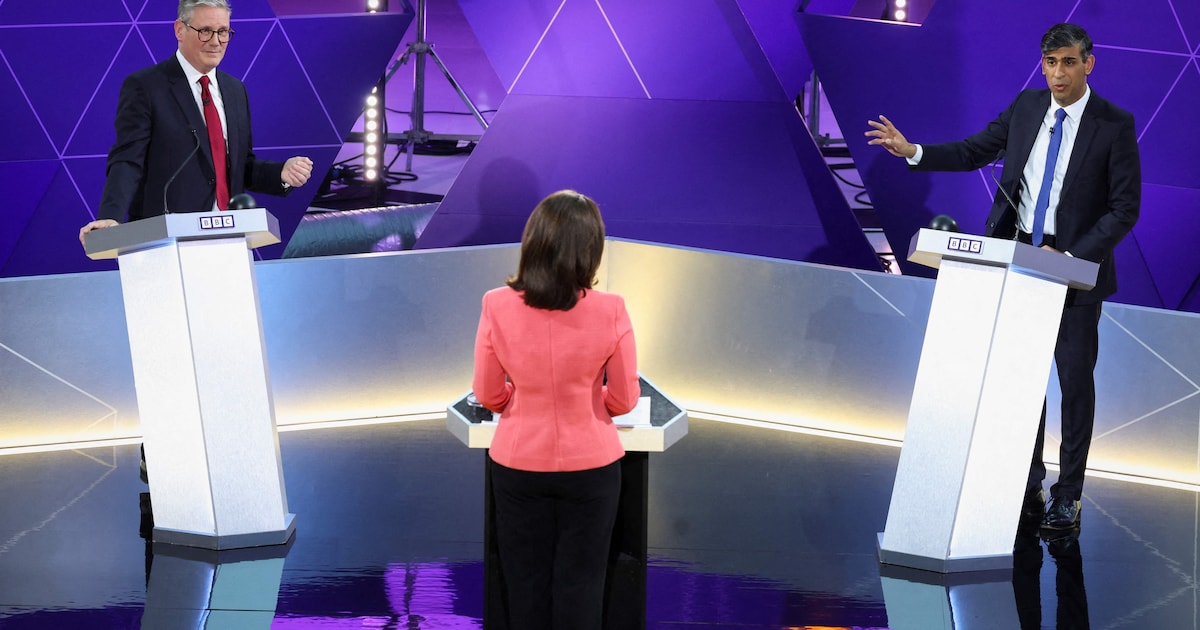
Prime Minister Rishi Sunak’s tactic in the final debate before Britain’s July 4 election was clear: warn that tax rises will undoubtedly come if the left-wing Labour Party comes to power. Sunak even used a significant part of his closing speech to emphasise that. To which Labour leader Keir Starmer exclaimed: “That’s a lie.”
It was equally heated when Starmer explained to Sunak why his plan to send a few hundred asylum seekers to Rwanda every year will not solve the problem of irregular migration. It clearly embarrassed Sunak, but he bounced back: how would Starmer solve the problem? And no, there was no very clear answer to that.
Sunak’s offensive tone sometimes made the viewer almost forget that his Conservative Party, and not Labour, is responsible for the country’s politics over the past fourteen years. Starmer tried to take advantage of this by presenting himself as worthy of prime minister as possible.
It was no surprise that Sunak entered the debate fiercely. BBC journalist Chris Mason said the Prime Minister had little to lose in the debate, which was only between Starmer and himself. Labor is so far ahead in the polls that no one in the UK can imagine Sunak will still be Prime Minister in two weeks’ time. He then already operated as if he were in the opposition.
Living expenses and immigration figures
Of course, Starmer wanted to talk about all the problems that have arisen in the country under the Conservative Party in recent years: the high cost of living, rising immigration numbers, the economic mismanagement of Sunak’s short-lived predecessor Liz Truss, and the much-criticized Boris Johnson’s coronary policy. “But this election is about the future,” Sunak responded. How did Starmer want to approach things in the coming years?
As the Labour leader has wanted to upset as few potential voters as possible throughout the campaign, he often achieved mediocre results. His answers often sounded evasive. Although he always tried to emphasise that if his party wins on 4 July, it will bring change and (economic) stability, after 14 years of continuous and often chaotic Conservative rule.
Starmer did not shy away from personal jibes either, unlike in an earlier debate. For example, he indirectly but cruelly hinted at Sunak’s vast material wealth. And he silenced the Prime Minister early in the debate, after his umpteenth interruption, with the words: “If you listened a bit more to the people in the room and in the country, you would lose touch with reality so lost.”
“Let’s not hand the country over to Labor”
Sunak, in turn, hoped his accusation that Starmer does not speak openly to voters would stand. “Don’t hand the country over to Labor,” he emphasized again and again.
The question is to what extent it was aimed solely at potential Labor voters. Because there was a big absence in the BBC debate: Nigel Farage, of the anti-immigration party Reform UK. Sunak also appeared to be mainly on the offensive to win back the many Conservative voters who appear to be defecting to Reform UK. An easier task now that Farage, very ironically, was not in front of him.
And Starmer? In her closing speech she also had an important message for her voters. Because with a lead as big as Labour’s, laziness (read: low turnout) lurks. That’s why he emphasized: if the British want change, they will really have to “vote for it.”





